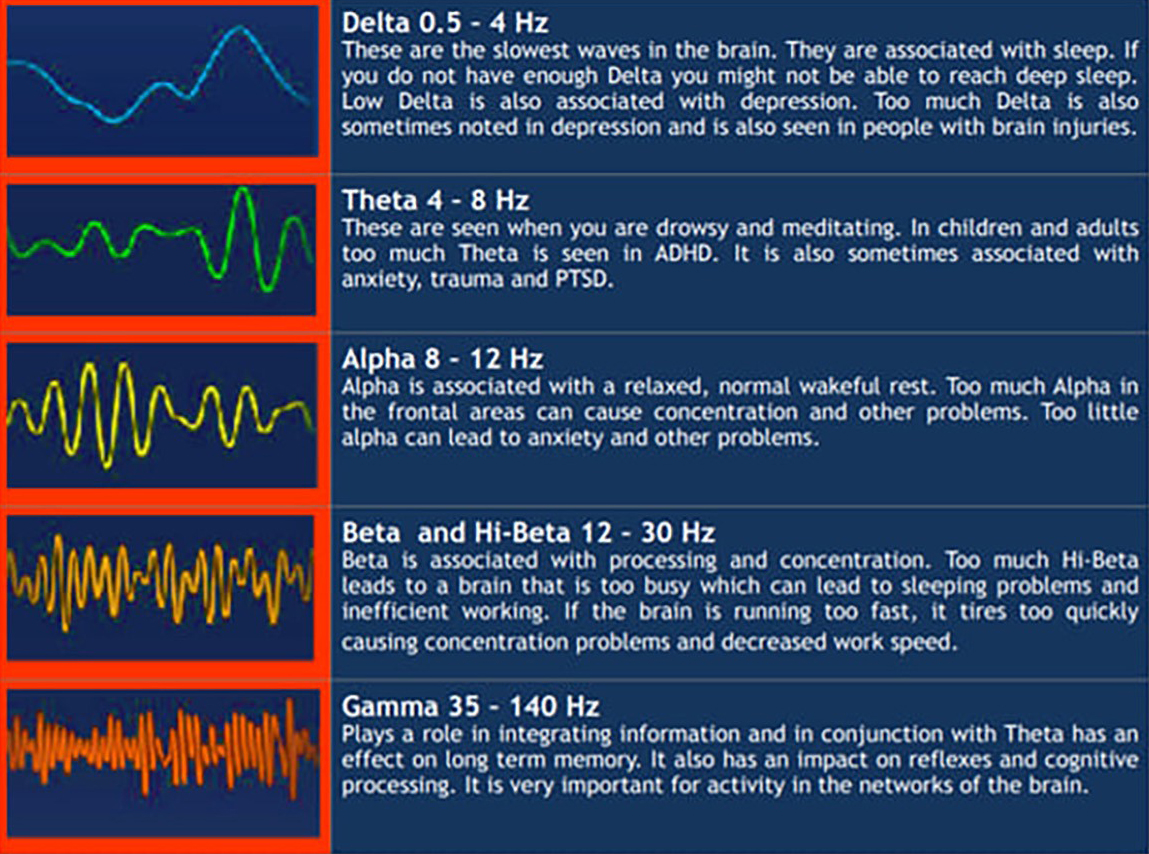There are also many studies that support the benefits of PEMF devices. The Harvard Medical School found that a PEMF device improves mood by over 10% after just one 20-minute treatment in patients with bipolar disorder and major depressive disorder (Rohan, et al, 2013).
In another 8-weeks long study, daily administration of PEMF resulted in a 50% reduction in depression in 49% of patients with treatment-resistant depression. (Larsen, et al, 2020).
Let’s look at some common brain abnormalities and how they relate to the person’s brainwaves.
PEMF And Brain Waves

PEMF Research
1. Attention Deficit Hyperactivity Disorder (ADHD)
ADHD brain in most cases have too much high beta and too little alpha, thus PEMF is used to stabilise the beta and to support the alpha frequency to perform at a better level. If alpha is not performing optimally it can lead to a loss of energy, concentration and focus and this leads to problems with learning.
2. Depression
A depressed brain in most cases has too little delta activity and too much alpha or beta activity in the frontal area. It is also usually much higher on one side than the other. For example, more alpha on the left side than the right side of the brain. This can cause the brain to react differently and think differently about things which can impact motivation and self-esteem.
3. Post-Traumatic Stress Disorder (PTSD)
Trauma can cause the brainwaves to become unbalanced. PTSD brain in most cases has a lot of beta and hi-beta activity, a lot of theta activity and almost no alpha activity. The brain is thus either in a state of “fight or flight.” Those with PTSD will either feel like withdrawing/ be switched off and struggle to focus or they can be in a constant heightened state where they are hyperactive, get angry easily and really struggle to control their emotions.
4. Anxiety
An anxious brain usually has a lot of hi-beta activity especially over the front middle part of the brain which plays a role in the fight or flight response as seen in PTSD. Also, the anxious brain usually lacks alpha and theta brainwaves. These are needed for the brain to be calm.
5. Insomnia (Sleep Disorder)
People with insomnia do not have enough delta activity which is needed for deep sleep. In combination with this, they often have too much high-beta activity which keeps the brain active and awake. Their brain also lacks alpha and theta activities. These calmer waves are needed for the person to remain calm and to switch off into sleep mode.
6. Stress
Brains that are stressed have too much hi-beta and insufficient alpha and lo-beta. Lo-beta brainwave is needed for a person to stay calm but very focused. When a person’s brain has too much high-beta, the brain will act as a super-high-speed train causing the person to easily get confused and overwhelmed. Plus, it tires out the brain so it cannot be maintained for a long time.
7. Autism
The autistic brain has too much theta and too little alpha. This affects the ability of the person to function well and to develop normally. Learning becomes a challenge because the specific areas in the brain would be overactive or over developed such as in mathematics but in other areas the brain might not function as well.
8. Alzheimer's Disease, Dementia and Memory Disorders
Abnormality of the brain can cause many issues such as personality changes, and in many cases aggression because the person will feel insecure causing the brain’s survival instincts to kick in. Often the comorbidity of anxiety-depression is present. Delta and theta will be high while alpha and beta would be below normal in the majority of the cases.
9. Parkinson
Theta and alpha imbalances cause those with Parkinson to have trouble focusing and staying still. Involuntary and uncontrollable movement of the muscles will be noticeable.
10. Tinnitus
People with tinnitus often have low alpha and increased delta, theta and gamma brainwaves. These types of brainwaves can cause ringing in the ear, which can lead the person to feel confused and hopeless.
Application of PEMF
PEMF is a viable and effective treatment for the following issues:
- Anxiety issues
- Concentration issues
- Enhances meditative states
- Improve sleep
- Reduce stress
PEMF is also a viable and effective method to reduce the impact and symptoms of chronic brain disorders such as:
- ADHD
- Alzheimer’s disease
- Autism
- Parkinson’s disease
- Post-traumatic stress syndrome (PTSD)
How does PEMF work?
PEMF modulates or tunes the neuronal frequencies or EEG of the brains by changing the frequencies and by modulating and stabilizing brainwave frequencies that are erratic and unstable.
In many ways it is similar to music, both PEMF and music are frequency based. Soft music can relax the brain and upbeat music can energize and make a person feel alive. There are 5 major frequency emitted, as seen above – and PEMF can be used to maximize your brainwave states.
The Tera P-90 is unique among all devices in that it implements the incredibly beneficial and potent Terahertz waves, which exponentially improves the benefits of PEMF alone.
